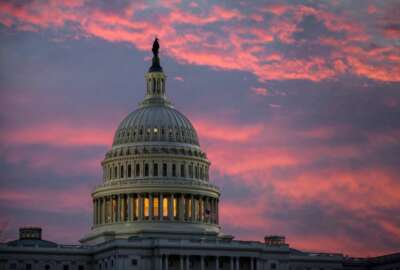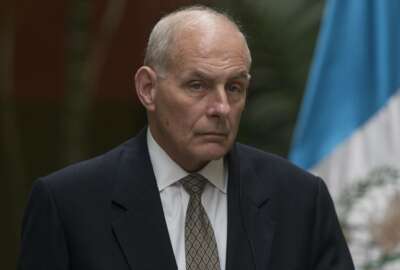
Sen. McCaskill: White House to freeze pay for civilian employees in 2019
A new report from Senate Homeland Security and Governmental Affairs Committee Ranking Member Claire McCaskill cites a pre-decisional budget "passback" document,...
The Office of Management and Budget is considering a pay freeze for civilian employees in 2019, according to a new report from Senate Homeland Security and Governmental Affairs Committee Ranking Member Claire McCaskill (D-Mo.).
The report from the committee’s Democratic staff is based on a pre-decisional document, known as the “passback,” which McCaskill’s office received from a whistleblower at the end of November. The document, titled “Department of Homeland Security Fiscal Year 2019 Budget and Policy Guidance,” details funding requests from the Homeland Security Department for fiscal 2019 and OMB’s subsequent response.
According to the report from McCaskill and minority committee members, DHS requested a pay raise for border patrol agents, Immigration and Customs Enforcement agents, Customs and Border Protection officers and other DHS employees.
But according to the document given to minority committee members, OMB denied DHS’ request to provide additional pay and added that the administration planned to issue a governmentwide pay freeze for civilian employees in 2019.
“Per governmentwide guidance, no civilian pay raise is included in the recommended level for the FY19 budget,” McCaskill’s report reads, quoting the “passback” document.
According to McCaskill’s report, the pay freeze would include federal employees serving in law enforcement positions throughout DHS. It would not apply to “non-civilian positions with the Coast Guard,” meaning that pay for members of the military would not be frozen.
A whistleblower gave McCaskill’s staff copies of the department’s “passback” with the Office of Management and Budget.
“This document provides an advance indication of the president’s likely guidance on FY 2019 funding levels for DHS discretionary resources,” McCaskill’s report said. “Additionally, it provides information on the needs of DHS as developed by the agency itself, independent of White House involvement. Typically, once the president has issued his budget, all departments are expected to publicly support his budget proposal as appropriate policy.”
Agencies typically spend the prior year preparing their budget requests to send to OMB. Once OMB has the materials, it reviews agencies’ submissions to make sure they match up with the president’s priorities for the next year. OMB communicates decisions from the White House about each agency’s budget through the “passback” process.
Though “passbacks” typically convey the administration’s plans for the upcoming budget request, things can change.
The Office of Management and Budget did not respond to requests for comment on the DHS passback document.
President Donald Trump is expected to release his fiscal 2019 budget proposal sometime in February.
DHS has already struggled to recruit and retain law enforcement officers, particularly border patrol agents in recent years. The Trump administration tasked the department to hire 15,000 additional ICE and border patrol agents to implement the president’s executive orders on immigration.
Minority committee members fear, however, that freezing pay for immigration officer and border patrol agents would stymie DHS’ efforts to hire top talent more quickly.
“For example, between FY 2013 and FY 2016, CBP hired an average of 523 border patrol agents each year,” McCaskill’s report said. “However, during this same period, CBP lost an average of 904 border patrol agents due to attrition each year. The implementation of a pay freeze will do little to incentivize law enforcement personnel at DHS components, who already face demanding jobs in often dangerous conditions, to continue their employment with DHS.”
An annual across-the-board pay adjustment formula in the Federal Employees Pay Comparability Act typically sets raises for most federal employees under the General Schedule. The president can choose to differ from this formula, and Congress can ultimately propose and pass any alternative numbers in its budget.
In his full budget request, President Donald Trump in May indicated his plans to set a pay at 1.9 percent higher for federal employees in 2018. He essentially confirmed that plan in August, when he announced a 1.4 percent average pay raise for most civilian employees, along with an additional 0.5 percent adjusted for locality pay.
Congress so far has been silent on a pay for federal civilian employees for 2018, though 12 House Republican and Democratic lawmakers called for pay parity between members of the military and civilian federal employees in a recent letter to the president.
Copyright © 2025 Federal News Network. All rights reserved. This website is not intended for users located within the European Economic Area.
Nicole Ogrysko is a reporter for Federal News Network focusing on the federal workforce and federal pay and benefits.
Follow @nogryskoWFED
Related Stories





